
Evan Semón Photography

Audio By Carbonatix
A large, ghoulish figure is pacing inside the Cheesman Park pavilion, each stride exaggerated with high leg lifts and stomps. Every now and then he lets out a dramatic snarl or growl, whipping his cape around his armor. With his fuchsia mohawk, undead face paint and alarming white-colored contacts, Lord Maris the Great would be recognizable to many in the music scene.
But not to a trio of tourists. “You’ve crossed into my lair!” he barks at them, then launches into a brief history of Cheesman Park’s beginnings as a cemetery. The only other person around appears to be on downers, a vacant look in his eyes. “That’s one of my guards,” Maris explains. “Yes, he looks like a normal mortal, but he, too, is undead, and he’s guarding my lair right now. You’ll see them here quite often.
“She will remain unharmed!” he commands the clueless dude, pointing at me with his large zombie gloves, complete with hot-pink nail polish on the talons. He then gestures to a vent in the pavilion floor. “This is my lair,” he growls. “Back in the ’70s, it was a men’s restroom, where men would meet up to have sex and do drugs. The city found out and sealed it down there. The bathroom stalls are still down there, and I decided to leave them because it adds such a nice, quaint touch.”
Maris has been wreaking havoc on – and bringing attention to – the local music scene since 2000, when he rose from the dead and made it his mission to “kill” all the bands that he considered competition for his own act. But he only has a few months each year to do so. According to his version of the undead legend, he must return to his lair on November 1, not to be seen again until he emerges in May. Otherwise, he could get in trouble with the big guy downstairs.
“The only thing that’s limited is that on the stroke of midnight on what you call Halloween, I have to return to my lair. … I return at the beginning of May during what’s called the months of darkness; they run through October 31,” he explains. “That is when darkness and evil have the upper hand in your realm called Earth!”
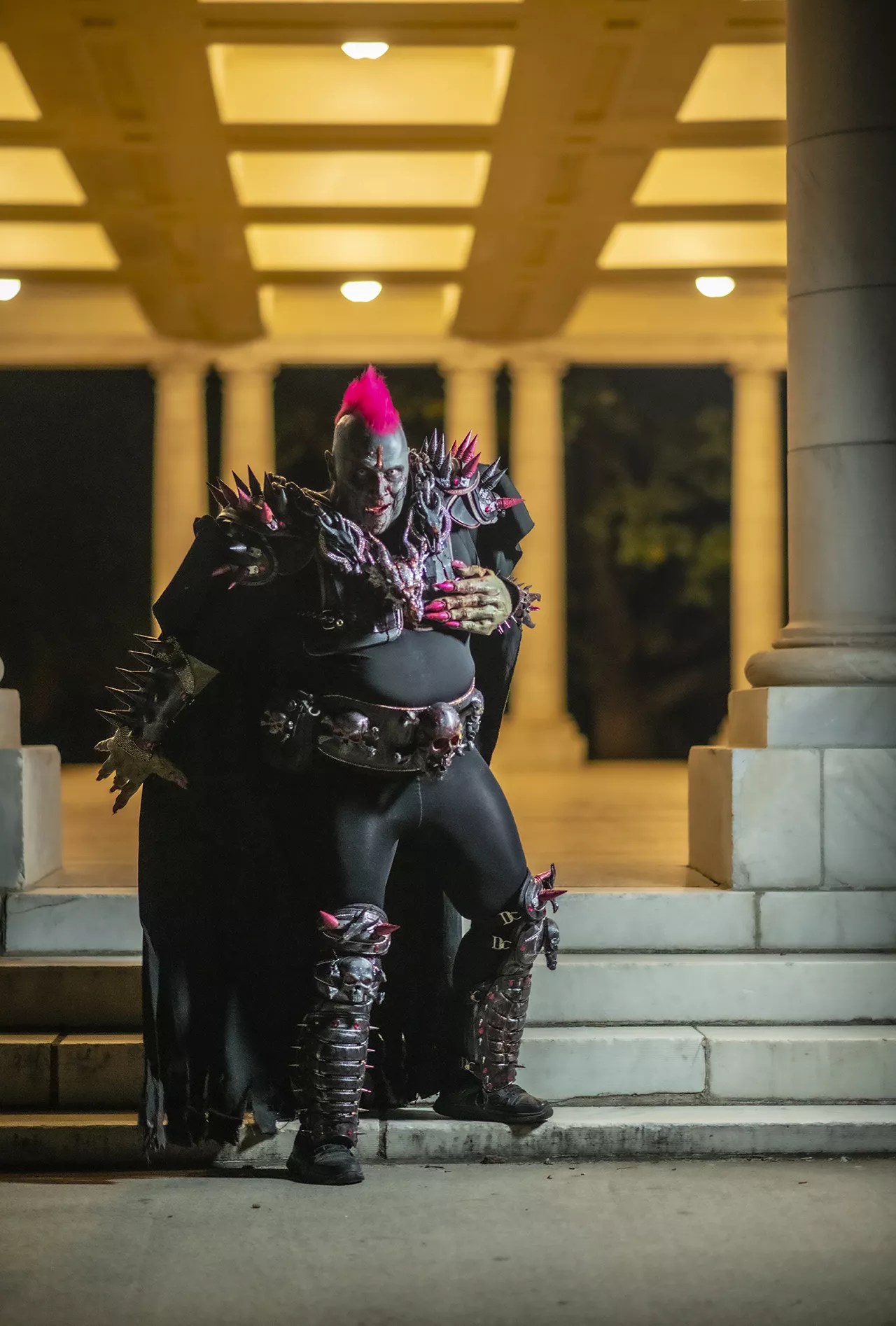
Maris can sometimes be found prowling around his lair in Cheesman Park.
Evan Semón Photography
But before Maris returns to his lair, he has an annual Halloween blowout with other rock, punk and metal bands, which traditionally involves reuniting a Mile High band of years past. This year’s showcase happens at Herman’s Hideaway on Friday, October 27. It will be Denver drag queen Jessica L’Whor‘s third time hosting the ghoulishly fun circus, which will include performances from Maris’s band, Maris the Great and the F.O.D.; Typhoid Mary (a metal band Maris once killed that’s reuniting for the occasion); Sin on Six; Honeybunches of Death; and A Vintage Future. The concert will also serve as a release show for Maris’s self-titled EP, which will be available on all streaming services the same day.
L’Whor describes the event as similar to seeing a “battle of the bands, where you have back-to-back really amazing bands that are playing, and everyone’s dancing and jumping up and down and rocking out, and it’s really cool to see that progress throughout the night. Also, everybody know: There’s such an acceptance for major queer energy.”
That can include drag queens tap-dancing to Maris’s signature gritty rock, touches that L’Whor says are “just so Maris.”
“This is something that could not have happened twenty years ago, maybe even ten years ago. Audiences, primarily heterosexual rockers, would have felt uncomfortable around a drag personality,” Maris notes. “Now they eat it up. It shows how much things have changed within your society.”
One of the openers, Honeybunches of Death, will be Maris’s final kill of 2023, on Halloween. He’s already killed Gravedancer, Good Family and Space Corpse this year; they’re included in the 154 murders displayed on his website, along with the bands’ final interviews. “I wish I could be around year-round. By the time I come back at the beginning of May, there’s a whole new crop of bands waiting to die,” Maris laments.
Bands generally consider it an honor to be killed by Maris; it means they’ve been acknowledged as ridiculously good by a punk-scene veteran. “Everything begins with me being a fan first,” Maris notes. “It’s all about that love and respect. I go check out the band. I even pay to get in. I’ll buy merch. Sometimes I go on Bandcamp and buy the album a couple times. If I like them, I start fucking with them. I threaten them, hit on all the members. I usually fall in love with the drummer. I watch how they react, and if they roll with it and have fun, I know they’re a good candidate to die. If they take life too seriously or ignore me and hope I go away…I do. Sometimes I will stalk a band for quite a while before I ask them if they want to do a murder feature. Also, sometimes the timing is off and it just doesn’t work out. The bands that are on my website went through quite an ordeal to get there.”
Back when he was a “mortal,” Maris moved to Denver from Montana in the early ’80s. “From what I remember, I was just an average gay man going to gay bars. But I did not fit in within the gay community,” he recalls. “The gay community was centered around dance music. I was a headbanger. And this was before the internet, so there was no way to find other gay headbangers. So I felt all alone. When I would go to the clubs, I would be thinking about Iron Maiden and MÁ¶tley Crüe and AC/DC. I would wear a MotÁ¶rhead T-shirt, and they would think I was a straight man coming in there to harass gay men, because I didn’t fit into the package.
“When I discovered the local music scene in late ’99, it changed everything,” he continues. “The rock-and-roll community is my community. That’s my family. Most of them are my minions now, because I’ve killed so many of them. But that’s where I feel like I’m with my people.”
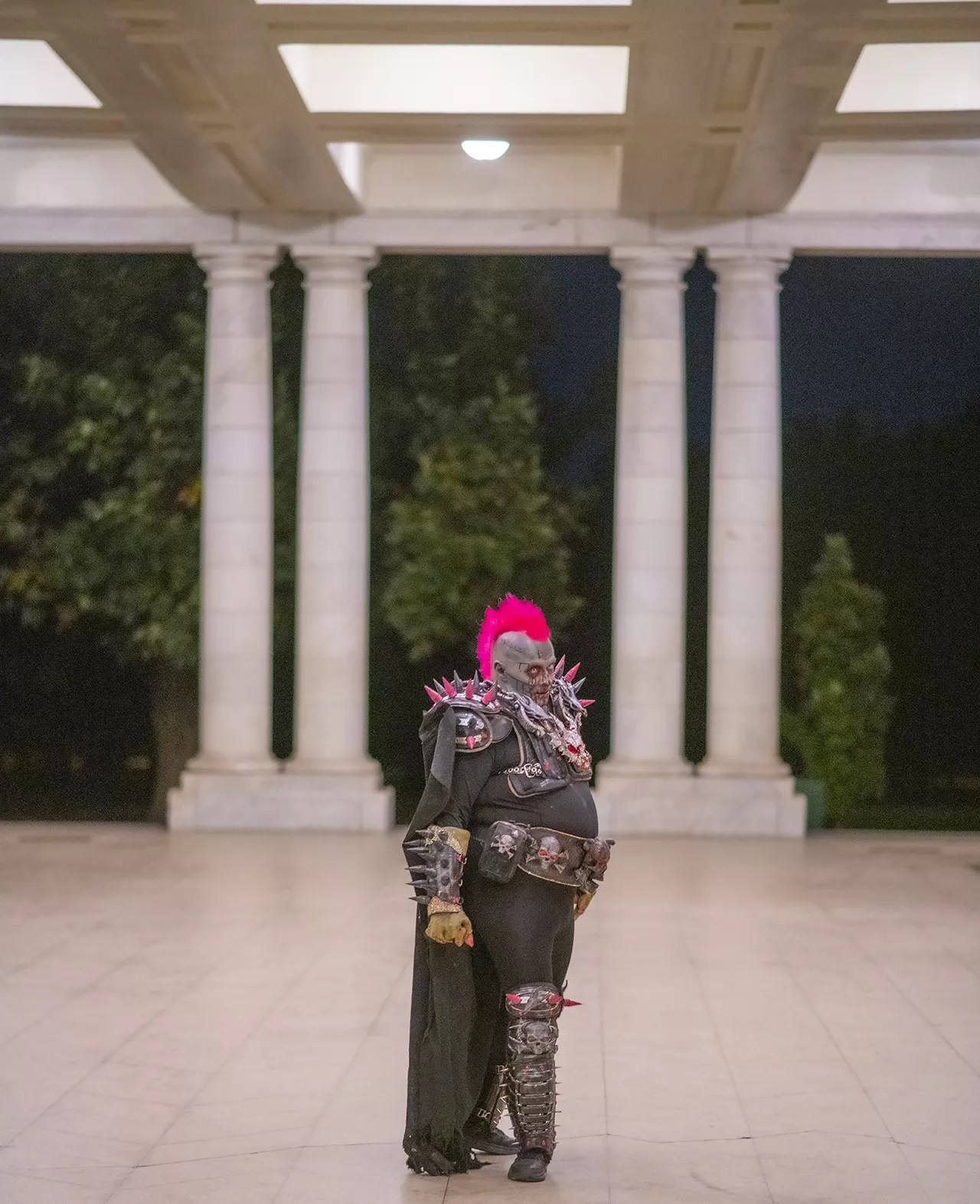
After the Halloween show at Herman’s Hideaway, Maris will retreat to his lair.
Evan Semón Photography
Maris, who rarely breaks character, says he was transformed into an undead master not long after he started his own band.
“I died in late ’99,” he recounts. “I had a band; it was called Maris the Very Good and the Heterosexually Challenged. We were a dance band. One night I picked up a trick and took him to a hotel. I thought he was the strong and silent type – turns out he was the strong undead type. He fucked me so hard, my head went through a headboard, which is how I got this scar” – he dips his head and points to a prosthetic scar, “stapled” shut.
“When I reanimated, I went back to my band and said, ‘Dance music is out, you see. We must become a rock-and-roll band,'” Maris goes on. “So we changed our name to Maris the Great and the Faggots of Death. But now we’re Maris the Great and the F.O.D., for PC society. I decided we would become the most popular band in the world. The only problem is, there were other bands vying for the same position. Thousands of bands. It was at that time I decided my mission in death was to kill all of the bands and eliminate the competition until only my band remains and becomes the most popular in the world! I’ve killed 154 bands, and there’s only about 1,532,000 more to go.”
His monstrous voice lilts with the comedic turns of his statement, leaning into the more bizarre aspects, as a standup does in a tight five. With fake blood spilling from his mouth and nose and gray stains covering his teeth, Maris cuts an eyebrow-raising image that matches his fictional beginnings, but it isn’t long before you’re in on the joke.
The police have had no choice but to be in on it: When Maris was getting photos taken for a poster to advertise his first Halloween showcase, he and a friend made a fake penis out of latex and meat to hang out of his mouth. “After we were done, we threw it on the ground,” Maris recalls. “The street got entirely closed down. Someone called to investigate the fake penis.”
One of his first kills, a manager at the Gothic Theatre, ended up having to go to the Englewood Police Department because someone saw Maris’s murder photos on the website and reported them. “When he walked in, the detective had pictures from my website all printed out on his desk. And he was like, ‘We figured it probably wasn’t real, because there are people smiling,'” Maris says, chuckling. “Because we all know that gay undead are real.”
His notoriety quickly grew, advancing Maris’s ultimate goal. And when it comes down to it, that has nothing to do with his character’s obsession with killing bands. “All I was trying to do was get the word out about the local music scene,” he says.
The work was so exhausting that the mortal Maris took a five-year break beginning in 2015. “I spent fifteen years being this character, and never came up for air. I would be in makeup for days at a time,” he recalls. “I slept on a bloody mattress. Theatrical blood was splashed all over the walls of my home. It’s much like what a method actor does with a role, but I didn’t know any of that. I didn’t know it can damage you. So around 2015, I was really fucked up and very ripe for spirituality. I found a master that taught me meditation, I became a philosophical Taoist and also became vegan. The pendulum just had to swing the other way for a while.”
But when in character, Maris attributes the hiatus to the complete decomposition of his body. “I acquired demonship fifteen years after I started here in Denver. I decomposed and went to hell. I joined a number of training programs to better myself – you can train as a demon, you know – and I became an awarded, decorated demon, with a demon name of Gay Zuzu,” he explains.
“Since my body completely decomposed, there was no way to come back here,” he continues. “However, in the ancient scrolls of Gomorrah, there was a ritual that had never been performed, that is decided by the local music scene here to perform. It is called the Dickening.”
So Maris rose from the dead in May 2020 through a ritual involving a “virgin boy toy” and a pentagram, and entered the local music scene once more. But the world had changed during the pandemic; people were spiraling in isolation, obsessing over whichever trend was the latest to condemn. There wasn’t much mental space left for understanding Maris’s mission.
“When I came back, a lot of people were offended, because I came back into a world that was filled with politics and whatnot,” Maris says. “And the dead really don’t care about your politics. We just want to have a good meal, we want to have superior butt sex, and I want my band to be number one.”
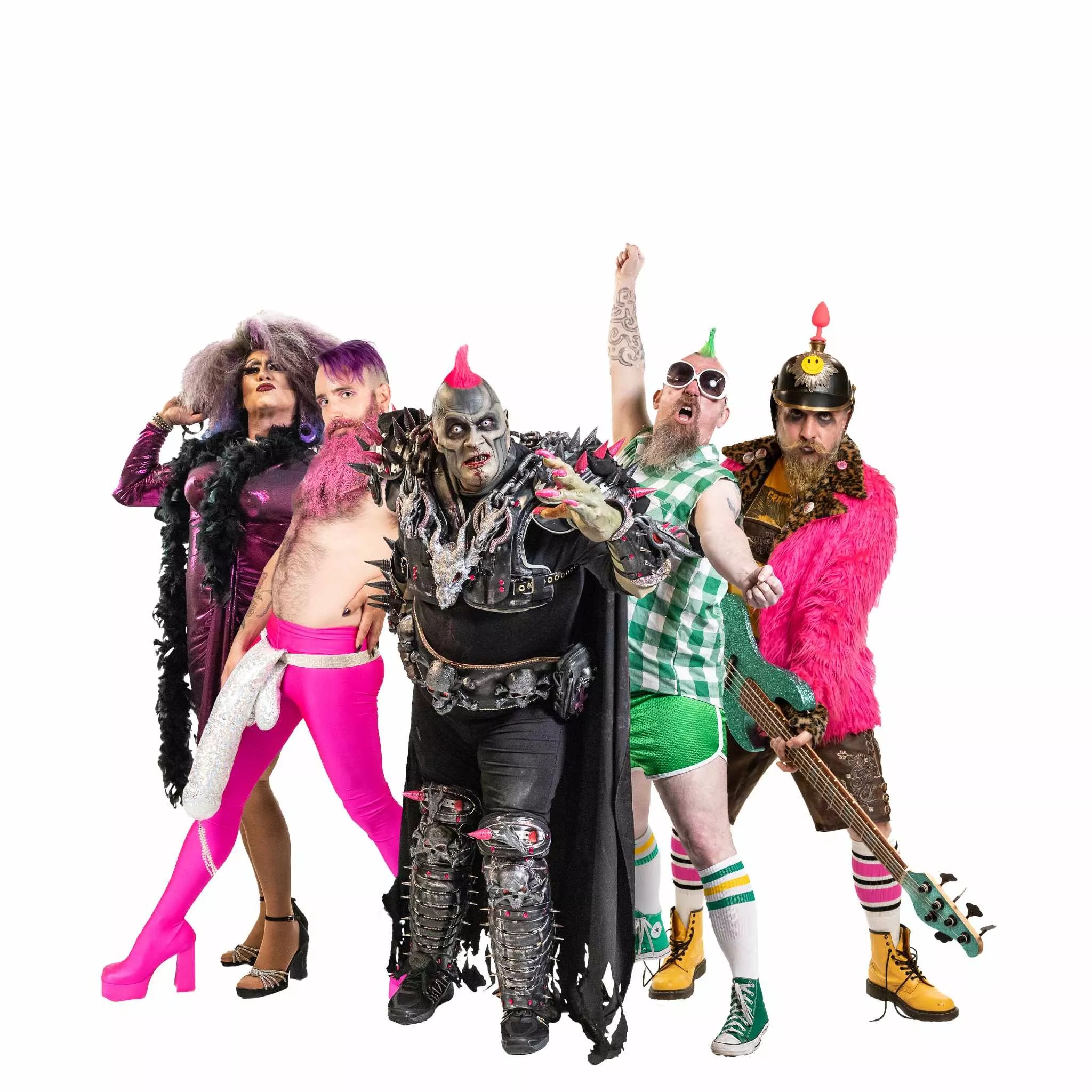
Steak Diane, Donga Summer, Maris the Great, Kermit the Fag and Baron von Buttfucker make up the band.
Andrea Thomas & Sinister Star
It initially translates as shock-jock dark humor akin to that of a John Waters film. But if people look beyond that, they’ll find a headier statement. When Maris and the F.O.D. formed 23 years ago, the band was an incredibly in-your-face LGBTQ+ act in a punk-rock genre that was dominated by straight men. And when Maris did have the “F” in F.O.D. spelled out, it was a reclamation of the word by a gay man who’d been called that word as an insult all his life (and this was long before Amber Rose made that concept popular with her Slut Walk).
L’Whor, the host of the Halloween-season showcase, says that critics who focus on the name of Maris’s band name need to go deeper: “I don’t think it needs to be as focused on, because it’s not with the intent of causing harm to others in the way that others use it to try to degrade or downplay queer people.
“I continue to this day, online and in person, to get called a faggot,” L’Whor continues. “And when I hear that, all I resort to is: We’re in 2023. Yes, I’m queer, gay, gender-fluid, non-binary. If that is the word that you want to refer to me as, it just doesn’t faze me the same way. It’s a lack of creativity. And I really like that nowadays, Maris has, like, not reclaimed it, but claimed it. He can say that. He can make that part of the title of his band.”
The name also has marketing value, L’Whor adds: “There’s a power behind the shock. When I tell people, ‘Oh, yeah, I’m doing this showcase for Maris the Great and the Faggots of Death,’ it’s such a memorable conversation starter. That part of it is in branding. It’s a memorable name. It alerts you to pay attention and not forget it. But if you talk to him more, you realize that it’s really just another way to say we’re expressing queerness.”
Kermit the Fag, a member of F.O.D., wrote the song “Go Fag” to say as much. “It’s a gay anthem on the surface, but it’s actually an anthem for anyone that’s felt like a freak and been called faggot,” Maris explains. “When I was mortal growing up, it was something that I thought only gay people experienced, but a lot of straight mortals told me over the years that they got called fag, usually by jock bullies or people in society that no one wants to be like. So Kermit’s idea is: Since none of us want to be like those people, then we’re all fags, and let’s make it something to stand up and be proud of.”
The band made a music video (X-rated, of course) for “Go Fag,” which shows mortal audiences “how zombies actually really act,” Maris attests. “Yes, we go around and we slobber, but we like to groom each other. And that means picking maggots off of each other. … So in the video, there’s zombies eating maggots out of people’s crevices.”
Be prepared: The video may be screened at the upcoming showcase. And because Maris’s show is for everyone, during bandmember Steak Diane’s “straight-pride song, called ‘I Like Pussy,'” all the straight couples in the audience will be invited on stage to make out.
“There are some gay activists who are upset about that. So someone’s always pissed off,” Maris says.
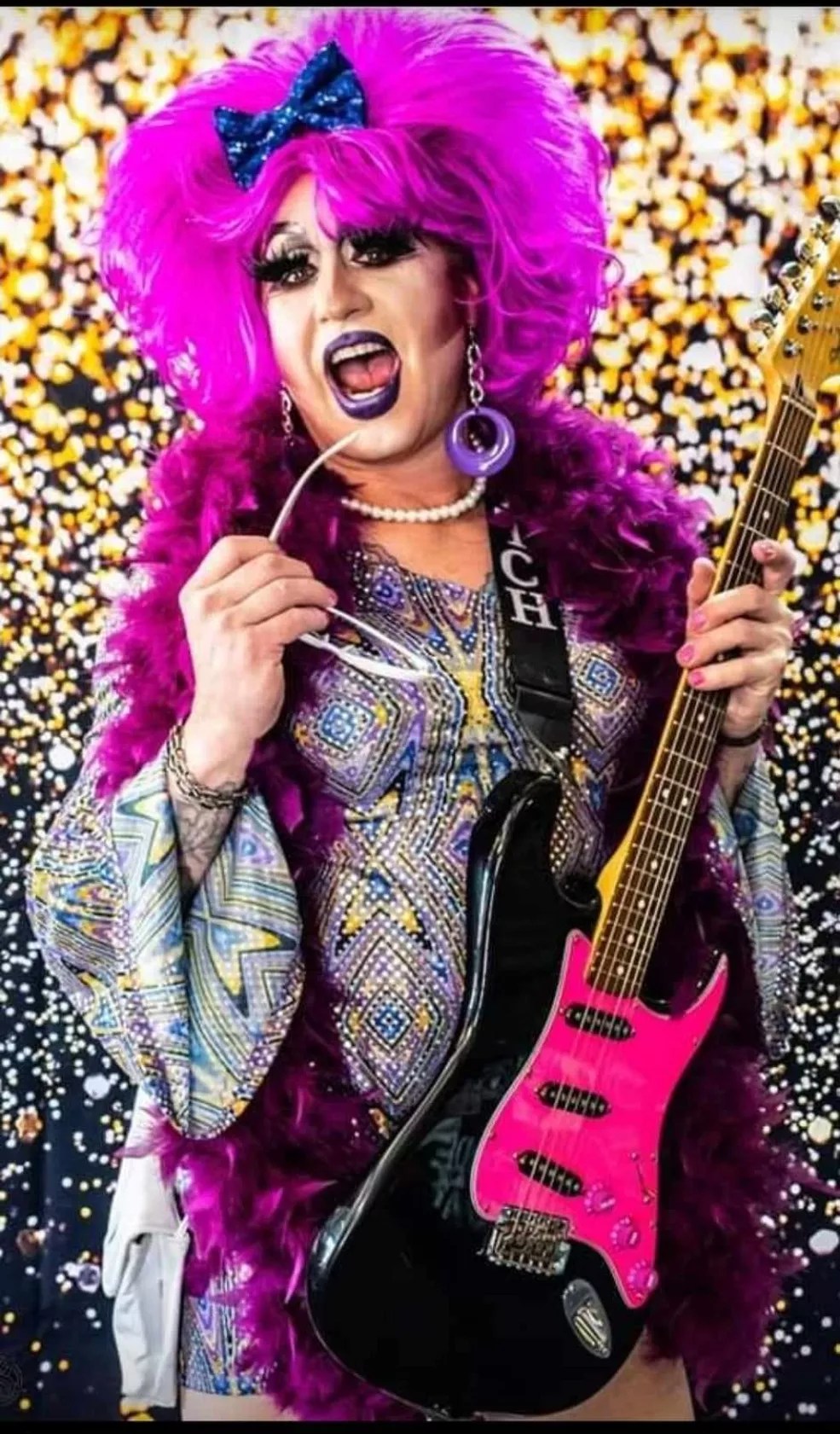
Miss Steak Diane is the band’s straight drag queen.
Andrea Thomas
He’s used to it, though, after two-plus decades. With such longevity, the lineup of Maris’s band has inevitably changed through the years. “I now have some mortals that are celebrated veterans in the local scene and nationally,” he says. But of course, they all play as different characters. Guitarist Patrick Goodwin, who is Kermit the Fag, joined the F.O.D. after playing in Pansy Division, a long-running gay rock band from San Francisco. “They were the first and they were pioneers. But he’s no longer in that band. He’s in mine. Because I’m more magnificent,” Maris explains.
There’s also bassist Rocky Ramjett of the Fabulous Boogienauts. “When he joined, we were trying to come up with the name for him, and I said, ‘So what’s your kink?'” Maris recalls. “And he goes, ‘I’m a full-on sodomite.'” So Ramjett became Baron von Buttfucker.
The group is rounded out by Green Druid drummer Mikey Honiotes, who performs as Donga Summer, and guitarist Philo Sudsberry, who was part of Blister 66, a popular Denver band back in the early 2000s. Sudsberry is the group’s only straight member, but he performs as drag queen Miss Steak Diane.
Maris has caught almost as much flak for the concept of a straight drag queen as he did for the band’s original moniker. “A lot of mortals are not political, necessarily, and they don’t feel strongly, necessarily, about causes,” Maris muses. “But they don’t want to appear that they’re not.”
L’Whor is Steak Diane’s “drag mother” of sorts, showing him the ropes on makeup, hair, performance and more. While L’Whor acknowledges there are straight men who wear drag in a one-off, mocking manner, that’s not what Sudsberry is doing. “Drag is an art form that is for everybody to express and try to the best of their abilities,” she says. “There’s a lot of straight people that do drag and try drag, and Steak has now created this as a persona. They care about their aesthetic; they care about their makeup and how it looks; they’ve invested time and thought into it.
“I can tell you that Steak Diane has put more effort into their drag persona than some drag queens that have been doing it consistently for three years,” L’Whor adds. “It’s about respect and caring and space. Steak never goes out of their way to think that just because they’re in drag, that it allows them a pass to act or be however they want. They’re always asking questions and learning and being respectful. … I think everybody has a little bit of that in-depth persona – which could be a drag persona – in them, and it’s just about when it comes out. Sometimes it takes some makeup, a dress and some rock music.”
For his part, Maris is proud of Sudsberry. “I like things that build a bridge,” he says. “At one time, mortals would have never thought of doing something that was considered gay. I think it’s a good thing that they’re doing it now.”
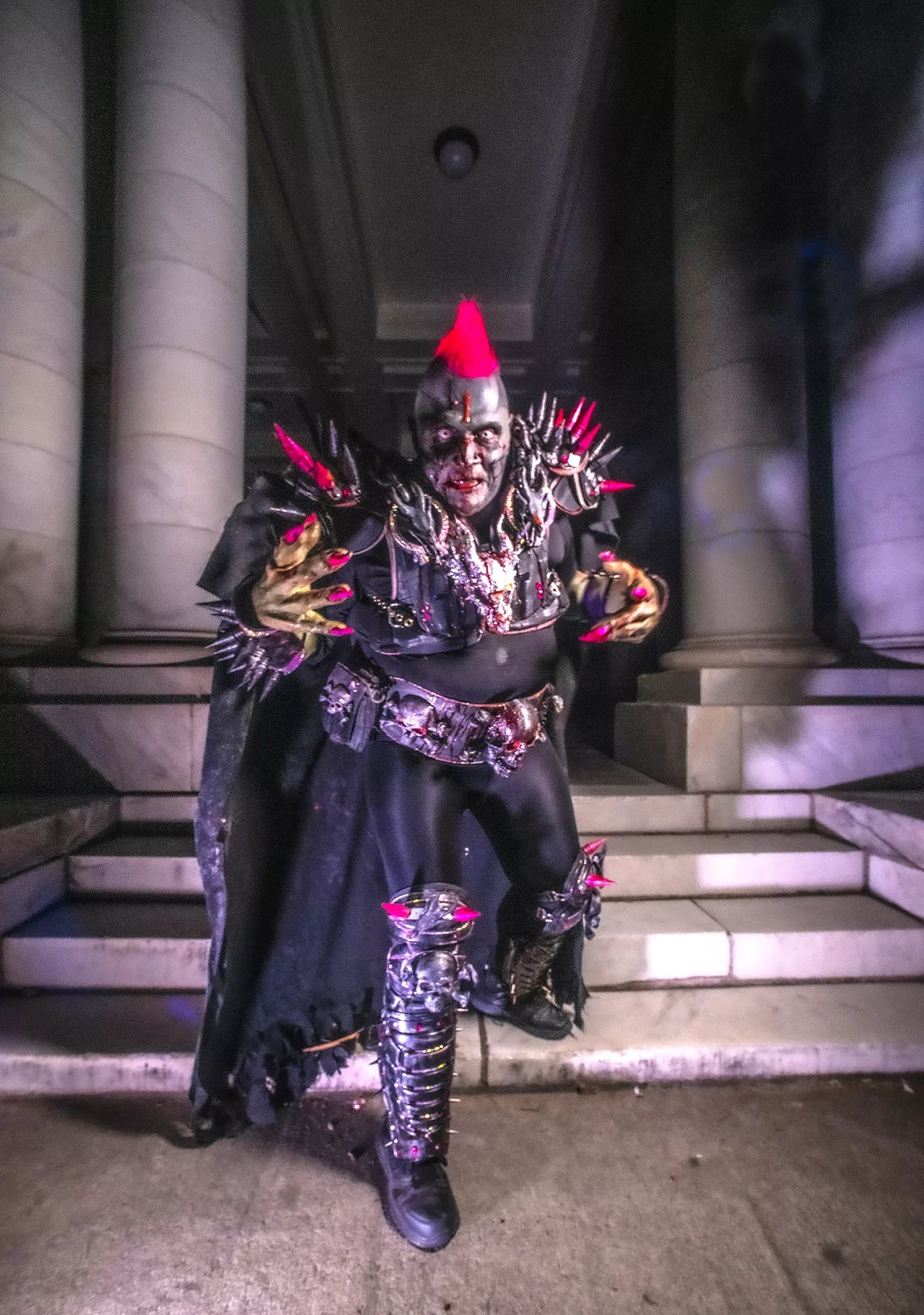
Maris says he’s a “promotional performance artist” rather than a musician.
Evan Semón Photography
L’Whor says that Maris, in both his music and his performance art, exemplifies how the LGBTQ+ community cannot be put in a box, and that’s particularly palpable at his annual Halloween showcase. “The music is intense, but it’s not in a way of making you fearful of it,” L’Whor says. “I think it’s queer music personified in a very different light. We think of a lot of the queer music as our divas – our Diana Rosses and our Chers, and this idea of love and glitter and ‘Dancing Queen.’ Instead, this is really hard-rock music, punk music that has queer words and experiences in it. … So it just proves that there’s genres and niches for everybody; not everybody’s into our classic divas. And sometimes, this is where they feel like they’re more connected as a queer person.”
L’Whor, who has also spent time with the mortal Maris, describes him as kind and genial, with a calming presence: “One of the things I really enjoyed the first time meeting is that we sat at a bar – Maris does not drink – and we just talked about their coming up in the music scene, their connection with drag, how things have changed with…not necessarily inclusivity, but the way that more pieces of the queer community can be included. The last three years, Maris always expressed to me wanting to include more elements of the queer community in their performances.
“You can tell that he has such an admiration for art and music and people’s expression, but also making sure that he’s so meticulous about his music and his shows,” L’Whor continues. “And it comes out at the showcases.”
As he looks forward to his big send-off at Herman’s before once again retreating to his lair, Maris also reflects on his impact. Never identifying as a musician, only a “promotional performance artist” out to spread the word about local bands, he spent years carving out a queer space in the local rock scene, and the undead bandleader is pleased to see a rise in LGBTQ+-fronted bands, especially locally. The Denver scene is his passion, and the idea of more freedom of expression for Mile High bands is enough to almost make him break character.
“We are living in a time where these bands can exist in a scene that, twenty years ago, wouldn’t have allowed a trans mortal to be fronting a band,” he says. “People wouldn’t have known how to take it, other than the most underground of the punks. But now you see every walk of life standing up and supporting trans mortals, gay mortals, queer mortals. It’s changing.
“It doesn’t change my plan at all; I’m still killing them,” Maris quickly adds. “It’s just – that’s something you should be proud of.”
Maris the Great and the F.O.D., 8 p.m. Friday, October 27, with Jessica L’Whor, Typhoid Mary, Sin on Six, Honeybunches of Death and A Vintage Future, Herman’s Hideaway, 1578 South Broadway. Tickets are $30.